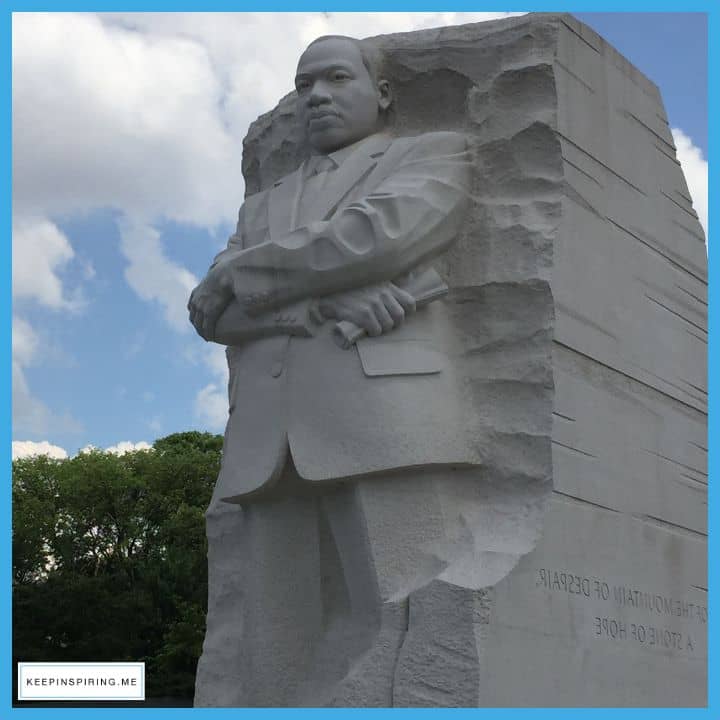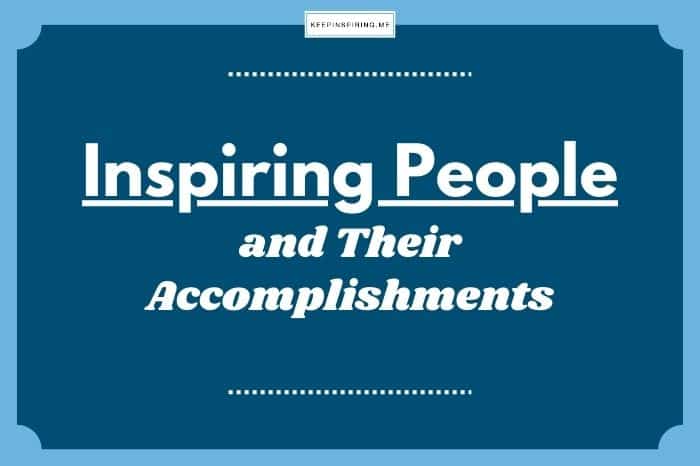Throughout history, countless individuals have inspired the world with their groundbreaking accomplishments.
Here, we celebrate some of the most influential figures from various fields, including civil rights, science, and the arts.
From peaceful protest movements to scientific breakthroughs and transformative inventions, these inspiring people left legacies that improved the human condition.
Let’s explore the extraordinary stories behind these trailblazers and their impact on the world.
1. Mahatma Gandhi
Born on October 2, 1869, in Porbandar, India, Mohandas Karamanchand Gandhi was an anti-colonial nationalist and political ethicist.
He was more commonly known as Mahatma (Great Soul) and became the main leader of India’s independence movement against British rule.
Ganhi’s Accomplishments
To achieve independence, Gandhi pioneered the use of nonviolent civil disobedience. This approach went on to inspire civil rights movements in the US, South Africa, and other countries.
He developed his philosophy of nonviolent resistance, known as satyagraha, while working as a lawyer in South Africa. Upon returning to India in 1915, he rallied urban laborers, farmers, and peasants to protest against land taxes and discrimination.

From 1921, he was the leader of the Indian National Congress. During his time in office, he led campaigns designed to achieve self-rule for his beloved nation.
The most famous of his campaigns were:
- The Salt March in 1930
- The Quit India movement in 1942
Ultimately, he played a pivotal role in India gaining its independence in 1947. Sadly, despite his longing for a more peaceful world, Gandhi was assassinated on January 30, 1948, by a Hindu nationalist.
Now, his birthday is celebrated every year around the world as the International Day of Nonviolence, and he continues to inspire generations of social and political leaders.
2. Martin Luther King Jr.
Martin Luther King Jr. was born in Atlanta, Georgia on January 15, 1929. He was a Baptist minister who became the most prominent leader of the American civil rights movement.
He was famed for his powerful oratory skills and nonviolent approach to battling racial inequality. As you can probably guess, he took a lot of inspiration from Gandhi.
His Accomplishments
His first campaign within the civil rights movement was the 1955 Montgomery bus boycott.
After this, in 1957, he formed the Southern Christian Leadership Conference to promote nonviolent and peaceful protest movements to achieve civil rights for African Americans.
During the March on Washington in 1963, he delivered the famous and iconic “I Have a Dream” speech, which inspired millions of people to support the civil rights movement.

A year later, he received the Nobel Peace Prize for his efforts in promoting peaceful opposition even in the face of violent attacks against him and other protestors.
Sadly, like Gandhi, he was assassinated. This took place in Memphis, Tennessee on April 4, 1968.
His death shocked the world, but Martin Luther King Jr. succeeded in mobilizing an entire generation to strive for civil rights and protest authority peacefully.
3. Marie Curie
Maria Salomea Skłodowska-Curie, commonly known as Marie Curie, was born in Warsaw, Poland on November 7, 1867.
She’s world-renowned as a pioneer in the fields of chemistry and physics and is most famous for her groundbreaking research into radioactivity.
Accomplishments
Curie began her academic studies in her native Poland but faced many barriers due to her gender. So, in 1891, she moved to Paris to study at the Sorbonne. After her studies, she entered the world of science alongside her husband, Pierre Curie.
It wasn’t long before her incredible talents were noticed and admired. As a result of her work, she became the first woman to receive the Nobel Prize in 1903.
As if that wasn’t enough, she went on to become the first person to win a Nobel Prize in two different scientific fields in 1911.
Some of her most notable achievements during her career include:
- The discovery of radium
- The discovery of polonium
- The development of X-ray units during the First World War
To this day, her legacy endures as a symbol of scientific excellence and female empowerment in the sciences.
4. Albert Einstein
Albert Einstein is one of the best-known people in human history and is regarded as one of the most influential scientists of all time.
He was born in Ulm, Germany, in 1879. From an early age, he was very interested in math and physics and had a clear aptitude for both disciplines.
Einstein’s Legacy
After graduating from the Swiss Federal Polytechnic School in Zurich, Einstein was working as a patent clerk when he published the “miracle years” papers in 1905. These papers included his famous equation “E=mc²” and his work on special relativity.
By 1915, he had completed his theory of general relativity which revolutionized our understanding of the universe.
For his work in theoretical physics, particularly the discovery of the law of photoelectric effect, Einstein was awarded the Nobel Prize for Physics in 1921.
Einstein emigrated to the US in 1933 due to the rise of the Nazi Party in Germany. During the Second World War, he warned the US government of the Nazis’ intentions to develop an atomic bomb. This was one of the reasons the US began its own atomic program.
He continued his research at the Institute for Advanced Study in Princeton, New Jersey until his death in 1955.
Einstein continues inspiring people to this day, especially those involved in science. Although he’s most famous for his contributions to cosmology and quantum mechanics, he was also known for his pacifism and humanitarian efforts.
5. Amelia Earheart
Amelia Earheart is regarded as a trailblazer in the world of aviation and was the first female to complete a solo flight across the Atlantic Ocean.
She was born in Kansas on July 24, 1897, and started taking flying lessons after watching a stunt-flying exhibition in 1920.
Her Accomplishments
Earheart solidified her status as one of the most inspiring people in aviation when she became the first woman to fly solo across the Atlantic in 1932.
However, her most enduring contributions came through her work with The Ninety-Nines. This was an organization of female pilots established by Earheart to inspire women to pursue a career in aviation.
In 1937, while attempting to circumnavigate the globe, Earheart disappeared while flying over the Pacific Ocean. Despite this tragic end, Earheart’s determination and courage have made her an enduring icon of aviation.
6. Sir Isaac Newton
Here, we have the third scientist on our list: Sir Isaac Newton. It’s fair to say that both Curie’s and Einstein’s accomplishments would have been impossible without the work of this inspiring man.
Newton was born in Woolsthorpe, England on January 4, 1643, and would go on to be a pivotal figure in the Scientific Revolution. He was one of the most groundbreaking mathematicians, physicists, and astronomers of all time and made significant contributions across multiple fields.
Newton’s Accomplishments
Newton amassed a huge list of accomplishments during his life, but is perhaps best known for formulating the laws of motion and universal gravitation, which were the dominant scientific theories for hundreds of years.
Some of his other most notable accomplishments include:
- In 1687, he published “Philosophiæ Naturalis Principia Mathematica”. This established the foundations for classical mechanics.
- He was one of the pioneers of calculus and developed his ideas independently of William Wilhelm Leibniz, who is often credited as the inventor of calculus.
- He helped advance the study of optics by discovering that white light is composed of a spectrum of colors.
- He served as the president of the Royal Society from 1672 until 1703.
- He received a knighthood in 1705.
Newton is, without question, one of the most influential and inspiring people to have ever lived. He changed the course of scientific history and our understanding of the natural world forever.
7. Florence Nightingale
Next, we have another inspiring woman who defied societal expectations and blazed a path along which many other women have since followed.
Florence Nightingale was a pioneering British nurse born in Florence, Italy on May 12, 1820. She was also a social reformer and statistician who is regarded as the founder of modern nursing.
Her Accomplishments
After training as a nurse in Germany, Nightingale’s revolutionary work truly took off during the Crimean War between 1854 and 1856. She cared for wounded soldiers and made significant strides in organizing how care was administered.
As a result, she greatly improved hygiene and reduced mortality rates. The compassion she showed to the soldiers during her nightly rounds even earned her the nickname “The Lady with the Lamp.”
Her greatest accomplishment of all was probably the establishment of the Nightingale Training School for Nurses, which was based at St. Thomas’ Hospital in London. This school played a pivotal role in elevating nursing to a respected profession for women.
Over the course of her life, Nightingale wrote more than 200 books and reports about healthcare. She used these publications to advocate for improved medical practices and more sanitary conditions. But her inspiring work didn’t just stop there.
She was also a statistical innovator and effectively communicated data using graphical representations.
In honor of her incredible contributions to healthcare, International Nurses Day is celebrated on her birthday every year. Plus, the Florence Nightingale Medal is regularly awarded to nurses who have provided exceptional care.
8. Malala Yousafzai
Malala Yousafzai is the only inspiring person on our list who is still living and, at just 27 years old, she has achieved more than many people do in a lifetime.
She was born in Mingora, Pakistan on July 12, 1997. She first gained recognition around the world for advocating for girls’ education in Pakistan’s Swat Valley. This was an incredibly courageous act as the Taliban had forbidden females from attending school.
Her Inspiring Accomplishments
At the tender age of 11, Yousafzai wrote blogs for the BBC about her life under Taliban rule. In later years, she began to give TV interviews and started to become fairly well-known.
Then, when she was only 15, she survived an assassination attempt by the Taliban while she was walking home from school.
For many people, this would’ve understandably been enough to put an end to their activism—but not for Malala Yousafzai. Instead, it strengthened her resolve, and her advocacy for women’s rights moved onto the global stage.
She carried on her work as a human rights activist and founded the Malala Fund to support girls’ education globally.
In recognition of her brave and important work, she was awarded the Nobel Peace Prize in 2014. She was only 17 at the time, making her the youngest person to ever receive it.
In more recent years, Yousafzai has written several books and graduated from the University of Oxford in 2020. Her bravery in the face of unbelievable adversity and her sheer determination to fight for a fairer, more peaceful world make her a true inspiration to us all.
9. William Shakespeare
Most people would agree that William Shakespeare is the most influential and inspirational literary figure in history. He was born on April 23, 1564 in Stratford-upon-Avon, England.
Not much is known about his personal life, but he was the preeminent poet and playwright of his time, and his works created the foundations on which English literature has been built.
His Accomplishments
Shakespeare wrote at least 154 sonnets and 37 plays. His work deals with universal themes like power, love, jealousy, betrayal, and the human condition. He is most famous for his plays which have been continuously performed for over 400 years.

Even if you haven’t read any of his works or seen any of his plays, you’ll probably still be familiar with their names. You may have also seen one of the many film adaptations of his most renowned works, such as:
- Romeo and Juliet
- Macbeth
- The Tempest
- Othello
- Hamlet
- King Lear
- Much Ado About Nothing
Shakespeare’s works are so popular and influential that they have helped shape the English language. In fact, many common phrases we still use today were coined by Shakespeare, including:
- “Break the ice”
- “Wild goose chase”
- “The world is my oyster”
- “The be-all and end-all”
- “In a pickle”
- “A heart of gold”
- “In my mind’s eye”
His plays were staged in the world-famous Globe Theatre in London which he co-owned, and are still performed there today. In the worlds of literature and language, Shakespeare might be the most inspirational person of all.
10. Wolfgang Amadeus Mozart
Wolfgang Amadeus Mozart is the only musician on our list – and he is undoubtedly one of the most inspirational. He was born in Salzburg, Austria on January 27, 1756.
From a very early age, he had prodigious musical talents and it didn’t take long for the world to notice.
Mozart’s Achievement’s
At just six years old, Mozart was performing in front of European royalty, and at this age, he had already started composing. He composed his first symphony when he was only eight years old.
His prolific composing talent spanned across many musical genres. This resulted in over 800 compositions including operas, symphonies, choral works, and chamber music.
His most famous compositions include the “Jupiter Symphony” and the serenade, “Eine Kleine Nachtmusik.” In terms of his operas, the most renowned are:
- “Don Giovanni”
- “The Marriage of Figaro”
- “The Magic Flute”
Although he passed away at the age of 35, Mozart’s many accomplishments during his short life are astounding. The works he produced in this time have had a lasting influence on composers ever since.
11. Emmeline Pankhurst
The final person on our list is Emmeline Pankhurst, who inspired an entire generation of women in the fight for equality. Born in Manchester, England on July 15, 1858, she went on to become the leader of the women’s suffrage movement.
She grew up in a political household and excelled in school. However, her education was limited due to the ever-present gender inequalities of the time. She married Richard Pankhurst in 1897, a barrister who was supportive of the women’s rights movement.
Pankhurst’s Accomplishments
Pankhurst’s life’s work was to agitate for women’s suffrage, meaning the right for women to vote for parties and political leaders. As the British government was highly resistant to this idea, Pankhurst formed the Women’s Social and Political Union (WSPU) in 1903 to try and cause a breakthrough.
As the years went by, the group’s activism became more radical and they often staged hunger strikes. As a result, Pankhurst and the other suffragettes were frequently jailed for their activities.
The WSPU ceased their activism during the First World War in order to support the war effort and, in 1918, the Representation of the People Act was passed. This granted limited voting rights to women over the age of 30.
The act represented some progress but women still didn’t have the same voting rights as men. Pankhurst continued her fight until she passed away on June 14, 1928.
Just a few weeks later, an updated version of the Representation of the People Act was passed, granting women full voting rights.
She may not have lived to see full suffrage for women, but Emmeline Pankhurst did as much as anyone to make it happen.
FAQs
What books or films can I explore to learn more about these individuals?
Some of the best books and films about the inspiring individuals on our list include:
- “Gandhi: An Autobiography – The Story of My Experiments with Truth” by Mahatma Gandhi.
- “Marie Curie: A Life” by Susan Quinn.
- “Suffragette” (2015) – features Meryl Streep as Emmeline Pankhurst
How can learning about these figures inspire personal growth?
Learning about these inspiring people gives you demonstrations of how qualities like courage, perseverance, leadership, and creativity can help you grow as a person and even change the world!
Plus, learning about figures like Mozart and Marie Curie can inspire your curiosity and encourage you to deepen your intellectual pursuits.
Are there any common misconceptions about any of these inspiring people?
As with most famous people, there are many common misconceptions about the individuals on our list. For example, many people living in the modern world think that Shakespeare wrote in an archaic version of English that was already well out of date during his own time.
In fact, Shakespeare’s use of language was considered to be very much of its time and has simply become outdated over centuries.
Our Take
Whether through the fight for justice, cultural contributions, or breakthroughs in science, each of these inspiring people has left an indelible mark on history. They remind us of the power of perseverance, courage, and vision.
We hope these inspiring people help you dream big, act boldly, and strive to make a difference, no matter how small. Their stories show it is indeed possible to accomplish extraordinary feats in short periods of time, and that it’s never too late to start!
